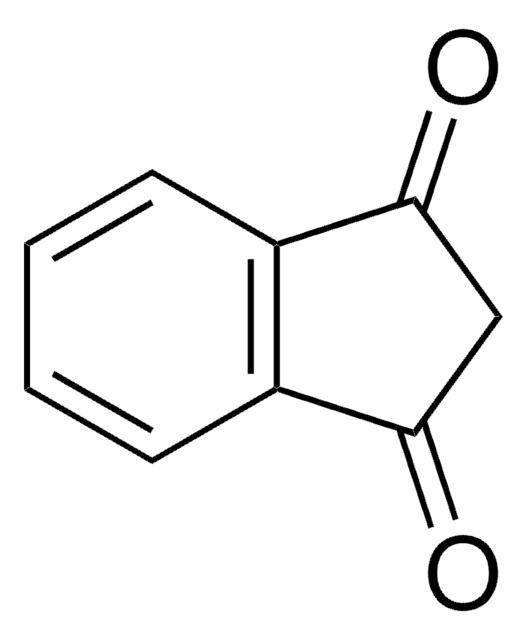38490
5,5-Dimethyl-1,3-cyclohexanedione
for HPLC derivatization, for the determination of aldehyde formaldehyde, ≥99.0%
Synonym(s):
Dimedone, Methone
Sign Into View Organizational & Contract Pricing
All Photos(1)
About This Item
Linear Formula:
(CH3)2C6H6(=O)2
CAS Number:
Molecular Weight:
140.18
Beilstein:
471489
EC Number:
MDL number:
UNSPSC Code:
12164500
PubChem Substance ID:
NACRES:
NA.21
Recommended Products
grade
for HPLC derivatization
Quality Level
Assay
≥99.0% (GC)
≥99.0%
quality
for the determination of aldehyde formaldehyde
mp
146-148 °C (lit.)
application(s)
general analytical
SMILES string
CC1(C)CC(=O)CC(=O)C1
InChI
1S/C8H12O2/c1-8(2)4-6(9)3-7(10)5-8/h3-5H2,1-2H3
InChI key
BADXJIPKFRBFOT-UHFFFAOYSA-N
Looking for similar products? Visit Product Comparison Guide
General description
5,5-dimethyl-1,3-cyclohexanedione (Dimedone) is basically a highly sensitive and very specific reagent used for the determination of aldehydes. It is highly advantageous as it is environment friendly, give high yields and is a simple workup procedure.
Application
5,5-dimethyl-1,3-cyclohexanedione may be used in condensation reaction with aromatic aldehyde in ethylene glycol. It may be also be used in trace analysis of aldehydes by HPLC.
Storage Class Code
11 - Combustible Solids
WGK
WGK 2
Flash Point(F)
Not applicable
Flash Point(C)
Not applicable
Personal Protective Equipment
dust mask type N95 (US), Eyeshields, Gloves
Choose from one of the most recent versions:
Already Own This Product?
Find documentation for the products that you have recently purchased in the Document Library.
Customers Also Viewed
Jesse C Patterson et al.
Cell systems, 8(2), 163-167 (2019-02-25)
Although elevated levels of reactive oxygen species (ROS) have been observed in cancer cells and cancer cells aberrantly proliferate, it is not known whether the level of reactive oxygen species and the accumulation of oxidative damage to macromolecules vary across
Solid-State Condensation Reactions Between Aldehydes and 5, 5-Dimethyl-1, 3-cyclohexanedione by Grinding at Room Temperature.
Tong-shou J
Synthetic Communications, 35 (17), 2339-2345 (2005)
Joseph R Burgoyne et al.
Biochemical Society transactions, 39(5), 1260-1267 (2011-09-23)
Elevated protein oxidation is a widely reported hallmark of most major diseases. Historically, this 'oxidative stress' has been considered causatively detrimental, as the protein oxidation events were interpreted simply as damage. However, recent advances have changed this antiquated view; sensitive
Beatriz Alvarez et al.
Methods in enzymology, 473, 117-136 (2010-06-02)
Protein sulfenic acids (R-SOH) are receiving increased interest as intermediates in redox processes. Human serum albumin, the most abundant protein in plasma, possesses a single free thiol. We describe herein the different methodologies that we have employed to study the
Candice E Paulsen et al.
Chemistry & biology, 16(2), 217-225 (2009-02-24)
Saccharomyces cerevisiae responds to elevated levels of hydrogen peroxide in its environment via a redox relay system comprising the thiol peroxidase Gpx3 and transcription factor Yap1. In this signaling pathway, a central unresolved question is whether cysteine sulfenic acid modification
Our team of scientists has experience in all areas of research including Life Science, Material Science, Chemical Synthesis, Chromatography, Analytical and many others.
Contact Technical Service











